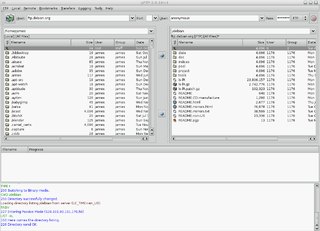The Secure Shell Protocol (SSH) is a cryptographic network protocol for operating network services securely over an unsecured network. Its most notable applications are remote login and command-line execution.
Uploading refers to transmitting data from one computer system to another through means of a network. Common methods of uploading include: uploading via web browsers, FTP clients], and terminals (SCP/SFTP). Uploading can be used in the context of clients that send files to a central server. While uploading can also be defined in the context of sending files between distributed clients, such as with a peer-to-peer (P2P) file-sharing protocol like BitTorrent, the term file sharing is more often used in this case. Moving files within a computer system, as opposed to over a network, is called file copying.
The File Transfer Protocol (FTP) is a standard communication protocol used for the transfer of computer files from a server to a client on a computer network. FTP is built on a client–server model architecture using separate control and data connections between the client and the server. FTP users may authenticate themselves with a plain-text sign-in protocol, normally in the form of a username and password, but can connect anonymously if the server is configured to allow it. For secure transmission that protects the username and password, and encrypts the content, FTP is often secured with SSL/TLS (FTPS) or replaced with SSH File Transfer Protocol (SFTP).

Squid is a caching and forwarding HTTP web proxy. It has a wide variety of uses, including speeding up a web server by caching repeated requests, caching World Wide Web (WWW), Domain Name System (DNS), and other network lookups for a group of people sharing network resources, and aiding security by filtering traffic. Although used for mainly HTTP and File Transfer Protocol (FTP), Squid includes limited support for several other protocols including Internet Gopher, Secure Sockets Layer (SSL), Transport Layer Security (TLS), and Hypertext Transfer Protocol Secure (HTTPS). Squid does not support the SOCKS protocol, unlike Privoxy, with which Squid can be used in order to provide SOCKS support.

A virtual file system (VFS) or virtual filesystem switch is an abstract layer on top of a more concrete file system. The purpose of a VFS is to allow client applications to access different types of concrete file systems in a uniform way. A VFS can, for example, be used to access local and network storage devices transparently without the client application noticing the difference. It can be used to bridge the differences in Windows, classic Mac OS/macOS and Unix filesystems, so that applications can access files on local file systems of those types without having to know what type of file system they are accessing.

GNU Wget is a computer program that retrieves content from web servers. It is part of the GNU Project. Its name derives from "World Wide Web" and "get". It supports downloading via HTTP, HTTPS, and FTP.
In computing, the SSH File Transfer Protocol is a network protocol that provides file access, file transfer, and file management over any reliable data stream. It was designed by the Internet Engineering Task Force (IETF) as an extension of the Secure Shell protocol (SSH) version 2.0 to provide secure file transfer capabilities, and is seen as a replacement of File Transfer Protocol (FTP) due to superior security. The IETF Internet Draft states that, even though this protocol is described in the context of the SSH-2 protocol, it could be used in a number of different applications, such as secure file transfer over Transport Layer Security (TLS) and transfer of management information in VPN applications.

Network-attached storage (NAS) is a file-level computer data storage server connected to a computer network providing data access to a heterogeneous group of clients. The term "NAS" can refer to both the technology and systems involved, or a specialized device built for such functionality.
cURL is a computer software project providing a library (libcurl) and command-line tool (curl) for transferring data using various network protocols. The name stands for "Client for URL".
Secure copy protocol (SCP) is a means of securely transferring computer files between a local host and a remote host or between two remote hosts. It is based on the Secure Shell (SSH) protocol. "SCP" commonly refers to both the Secure Copy Protocol and the program itself.

GNU Screen is a terminal multiplexer, a software application that can be used to multiplex several virtual consoles, allowing a user to access multiple separate login sessions inside a single terminal window, or detach and reattach sessions from a terminal. It is useful for dealing with multiple programs from a command line interface, and for separating programs from the session of the Unix shell that started the program, particularly so a remote process continues running even when the user is disconnected.

FileZilla is a free and open-source, cross-platform FTP application, consisting of FileZilla Client and FileZilla Server. Clients are available for Windows, Linux, and macOS. Both server and client support FTP and FTPS, while the client can in addition connect to SFTP servers. FileZilla's source code is hosted on SourceForge.

gFTP is a free and open-source multithreaded File Transfer Protocol client program. It is most used on Unix-like systems such as Linux, macOS, and Sony PlayStation 3. It includes both a graphical user interface (GUI), which utilizes the GTK+ graphical toolkit, and a command-line interface. gFTP is released under the terms of the GPL and has been translated into 45 languages.
This article lists communication protocols that are designed for file transfer over a telecommunications network.

BitlBee is a cross-platform IRC instant messaging gateway, licensed under the terms of the GNU General Public License.
The following tables compare general and technical information for a number of File Transfer Protocol (FTP) clients. Unless otherwise specified in footnotes, comparisons are based on the stable versions without any add-ons, extensions, or external programs.
The following tables compare general and technical information between a number of notable IRC client programs which have been discussed in independent, reliable prior published sources.

BackupPC is a free disk-to-disk backup software suite with a web-based frontend. The cross-platform server will run on any Linux, Solaris, or UNIX-based server. No client is necessary, as the server is itself a client for several protocols that are handled by other services native to the client OS. In 2007, BackupPC was mentioned as one of the three most well known open-source backup software, even though it is one of the tools that are "so amazing, but unfortunately, if no one ever talks about them, many folks never hear of them".
Files transferred over Shell protocol (FISH) is a network protocol that uses Secure Shell (SSH) or Remote Shell (RSH) to transfer files between computers and manage remote files.
Quagga is a network routing software suite providing implementations of Open Shortest Path First (OSPF), Routing Information Protocol (RIP), Border Gateway Protocol (BGP) and IS-IS for Unix-like platforms, particularly Linux, Solaris, FreeBSD and NetBSD.









